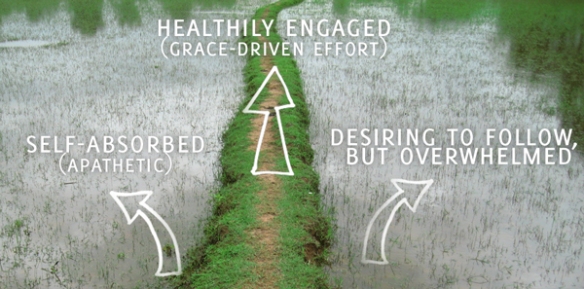A man shall leave his father and mother and be united to his wife, and the two will become one flesh. This is a profound mystery. . . .
—Ephesians 5:31-32
 “I’m tired of listening to sentimental talks on marriage. At weddings, in church, and in Sunday school, much of what I’ve heard on the subject has as much depth as a Hallmark card. While marriage is many things, it is anything but sentimental. Marriage is glorious but hard. It’s a burning joy and strength, and yet it is also blood, sweat, and tears, humbling defeats and exhausting victories. No marriage I know more than a few weeks old could be described as a fairy tale come true. Therefore, it is not surprising that the only phrase in Paul’s famous discourse on marriage in Ephesians 5 that many couples can relate to us verse 32, printed above. Sometimes you fall into bed, after a long, hard day of trying to understand each other, and you can only sigh: ‘This is all a profound mystery!’ At times, your marriage seems to be an unsolvable puzzle, a maze in which you feel lost.”
“I’m tired of listening to sentimental talks on marriage. At weddings, in church, and in Sunday school, much of what I’ve heard on the subject has as much depth as a Hallmark card. While marriage is many things, it is anything but sentimental. Marriage is glorious but hard. It’s a burning joy and strength, and yet it is also blood, sweat, and tears, humbling defeats and exhausting victories. No marriage I know more than a few weeks old could be described as a fairy tale come true. Therefore, it is not surprising that the only phrase in Paul’s famous discourse on marriage in Ephesians 5 that many couples can relate to us verse 32, printed above. Sometimes you fall into bed, after a long, hard day of trying to understand each other, and you can only sigh: ‘This is all a profound mystery!’ At times, your marriage seems to be an unsolvable puzzle, a maze in which you feel lost.”
—Tim and Kathy Keller, The Meaning of Marriage: Facing the Complexities of Commitment with the Wisdom of God, 21.
The publisher’s description of The Meaning of Marriage:
Based on the sermon series by Timothy Keller, this book shows everyone—Christians, skeptics, singles, long-time married couples, and those about to be engaged—the vision of what marriage should be according to the Bible.
Modern culture would make you believe that everyone has a soul-mate; that romance is the most important part of a successful marriage; that your spouse is there to help you realize your potential; that marriage does not mean forever, but merely for now; that starting over after a divorce is the best solution to seemingly intractable marriage issues. All those modern-day assumptions are, in a word, wrong.
Using the Bible as his guide, coupled with insightful commentary from his wife of thirty-six years, Kathy, Timothy Keller shows that God created marriage to bring us closer to him and to bring us more joy in our lives. It is a glorious relationship that is also the most misunderstood and mysterious. With a clear-eyed understanding of the Bible, and meaningful instruction on how to have a successful marriage, The Meaning of Marriage is essential reading for anyone who wants to know God and love more deeply in this life.
Book trailer:
The short Introduction chapter is available online, and here’s a chapter-by-chapter outline in the authors’ own words:
Chapter 1 – Puts Paul’s discussion into today’s cultural context and lay out two of the most basic teachings by the Bible on marriage— that it has been instituted by God and that marriage was designed to be a reflection of the saving love of God for us in Jesus Christ.
Chapter 2 – Present Paul’s thesis that all married partners need the work of the Holy Spirit in their lives. The work of the Spirit makes Christ’s saving work real to our hearts, giving us supernatural help against the main enemy of marriage: sinful self-centeredness. We need the fullness of the Spirit if we are to serve one another as we should.
Chapter 3 – Gets us into the heart of what marriage is all about— namely, love. But what is love? This chapter discusses the relationship of feelings of love to acts of love and the relationship of romantic passion to covenantal commitment.
Chapter 4 – Addresses the question of what marriage is for: It is a way for two spiritual friends to help each other on their journey to become the persons God designed them to be. A new and deeper kind of happiness is found on the far side of holiness.
Chapter 5 – Lays out three basic skill sets through which we can help each other on that journey.
Chapter 6 – Discusses the Christian teaching that marriage is a place where the two sexes accept each other as differently gendered and learn and grow through it.
Chapter 7 – Helps single people use the material in this book to live the single life well and to think wisely about seeking marriage themselves.
Chapter 8 – Takes on the subject of sex, why the Bible confines it to marriage, and how, if we embrace the Biblical view, it will play out in both the single life and in marriage.












